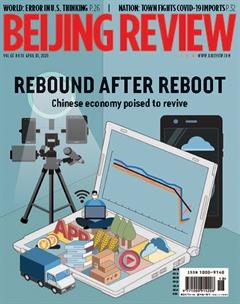A Rational Perspective
The Chinese economy recorded a 6.8-percent drop in GDP in the fi rst quarter over the same period last year, the first since 1992, when the GDP began to be accounted. Though a drop was anticipated, still the growth rate figure issued by the National Bureau of Statistics (NBS) has triggered excessive concern and pessimism.
While concerns about the economic conditions are understandable, exaggerated dismay serves no purpose. For starters, the fi gure is actually better than expected. Many international institutions had forecast that the Chinese economy would decline 8-10 percent year on year in the first quarter, which makes the 6.8-percent fall better than what was anticipated.
Also, the economy performed differently in the fi rst three months. The GDP fell steeply in January and February but rebounded in March. It reflects a fact that while the epidemic affected the economy in January and February, once the containment measures became effective and work resumption started, it has been returning to normal since March.
It should also be noted that the epidemic didnt actually damage the economy extensively. The GDP dropped in the first quarter mainly because the economy paused. After the restart button was pressed, it has been reactivated.
Besides, the fundamentals underpinning Chinas long-term growth have not been affected by the epidemic. For example, Chinas large market size, its sound industrial foundations, ample labor supplies, human resources and effi cient logistics and transportation remain unchanged. The policy of the Chinese Government to further reform and opening up also remains unchanged.
On the same day the NBS released the economic figures for the first quarter, the Political Bureau of the Communist Party of China Central Committee held a meeting to arrange the economic work. The meeting decided that efforts must be made to ensure that the epidemic does not rebound while steadying the economic fundamentals and securing peoples basic livelihood.
Initiative will be taken to advance work resumption at all fronts with regular epidemic prevention and control measures in place and fi ght the epidemic persistently to bring economic and social activities completely back to normal.
The meeting also established the goal of ensuring employment, peoples basic needs, survival of market players and grain and energy security. Industry, supply chains and operations of community organizations will be stabilized for the economy to maintain stability and growth.
Judging from the current situation, the biggest uncertainty affecting the Chinese economy this year lies not inside China, but outside it, that is, how the pandemic is controlled in the whole world. If it cant be brought under control worldwide, it will be hard for foreign trade to recover.
China still remains a strong engine of global economic growth. If the Chinese economy performs poorly, the world economy might not be better off. Every economy is a member of the global village and the global spread of the virus has demonstrated the importance of solidarity. The international community needs to enhance global cooperation to fight the virus and revitalize the economy, now and in the future.

